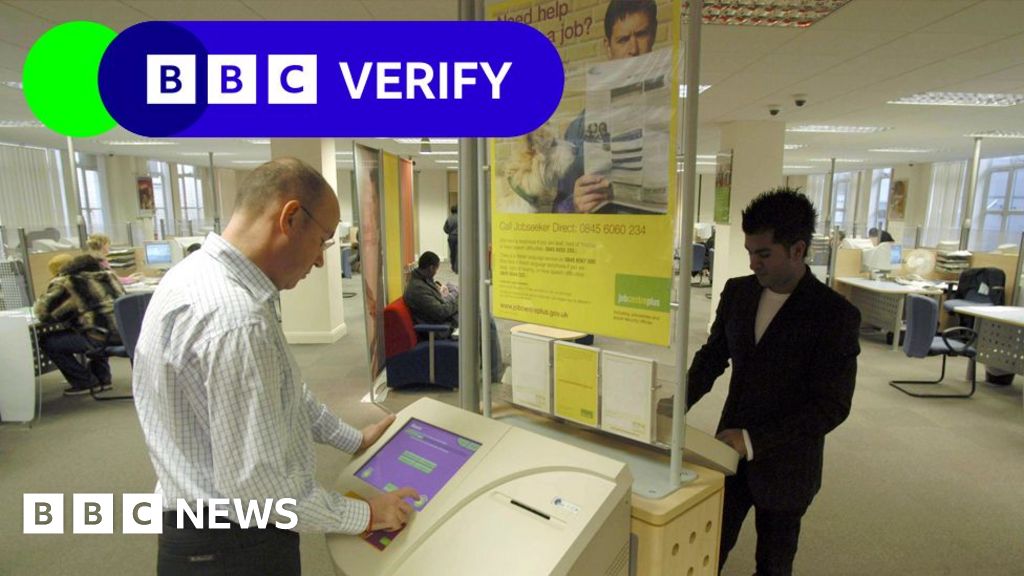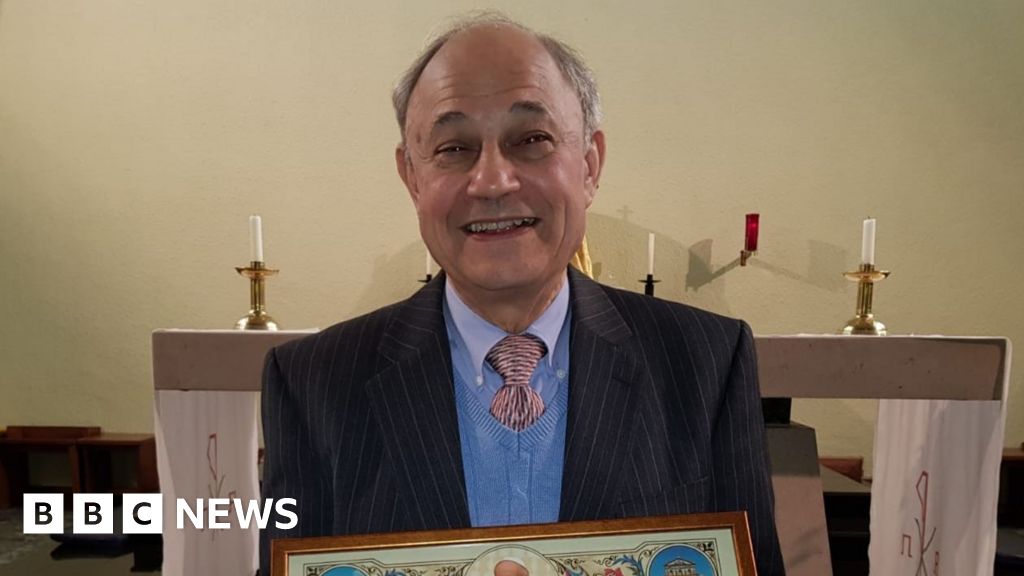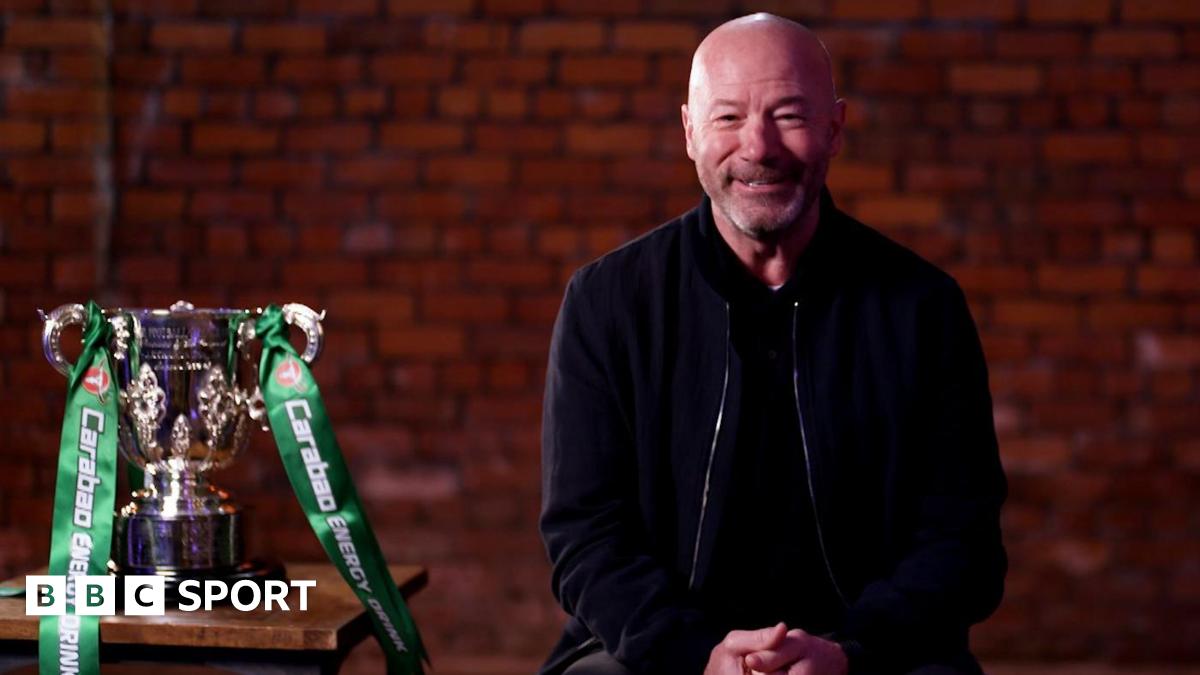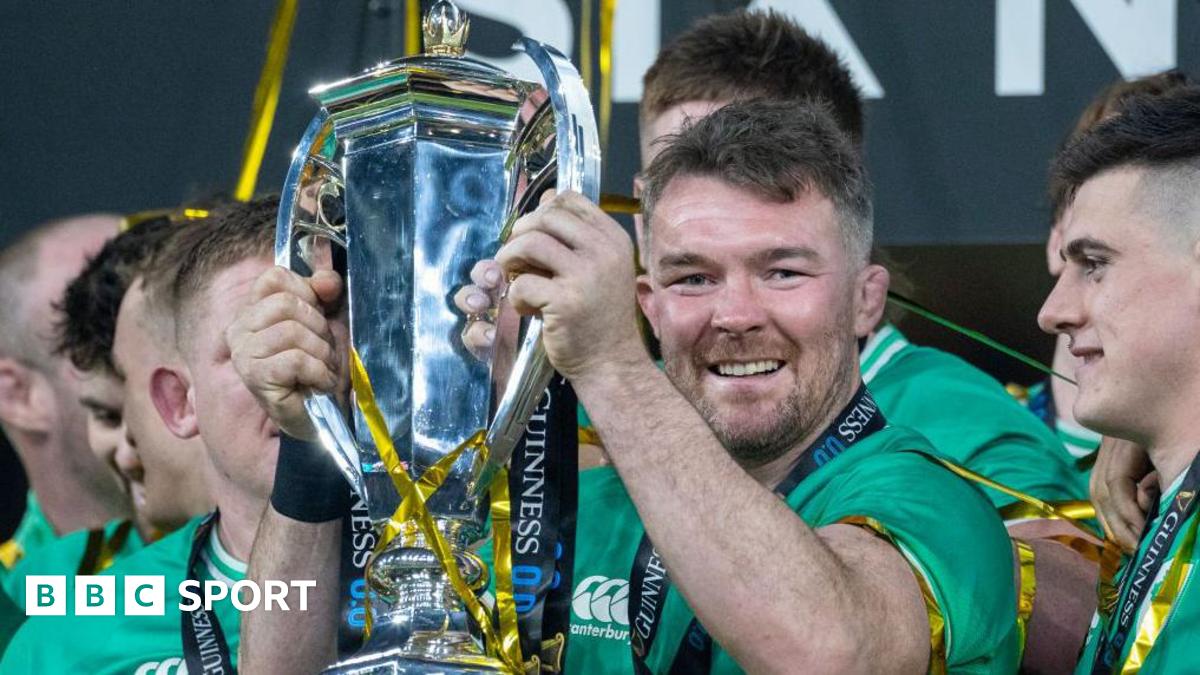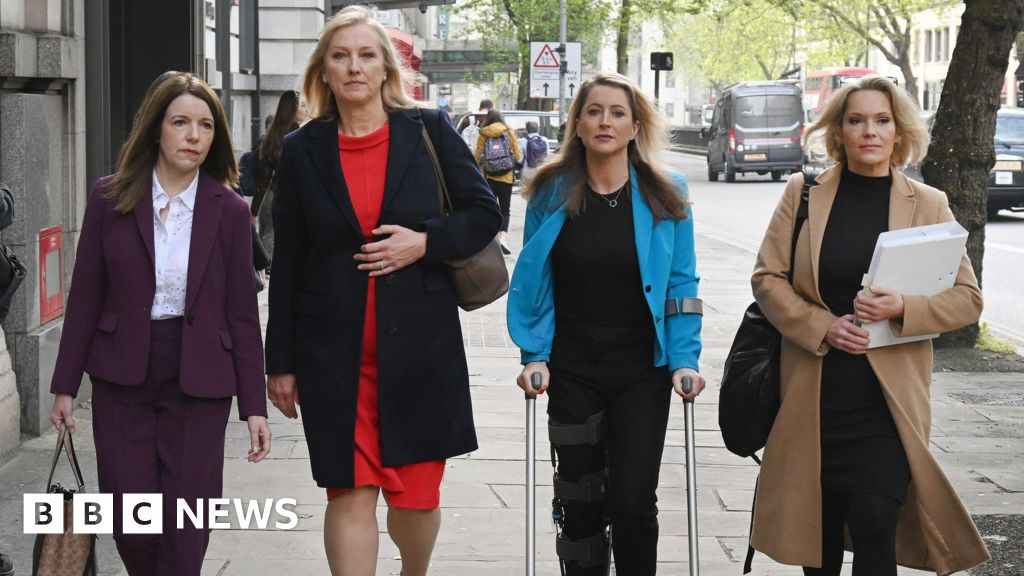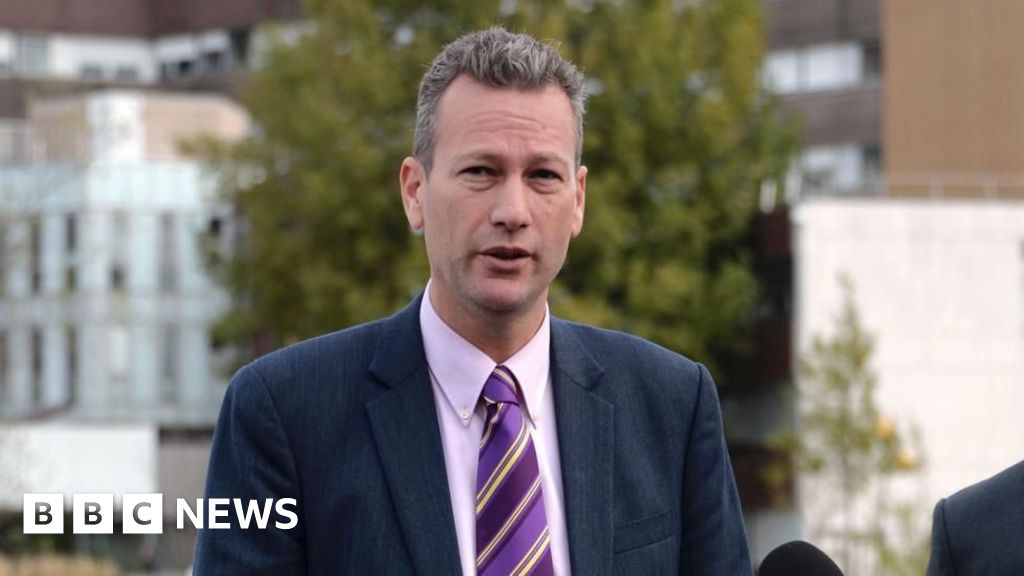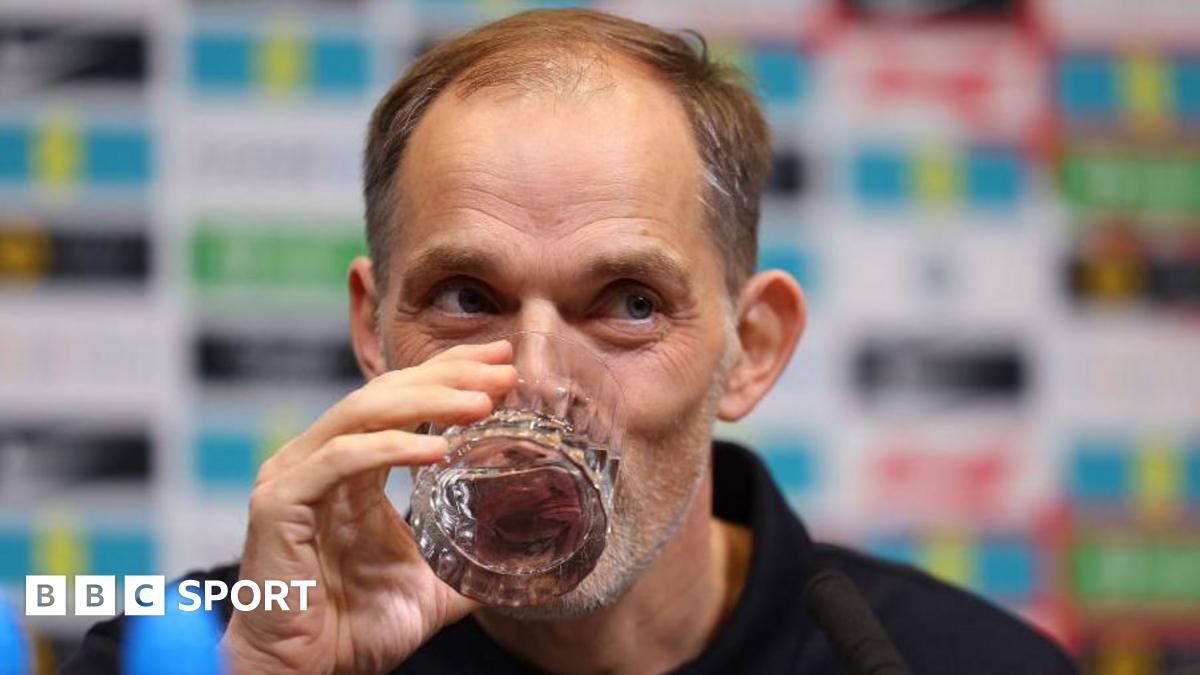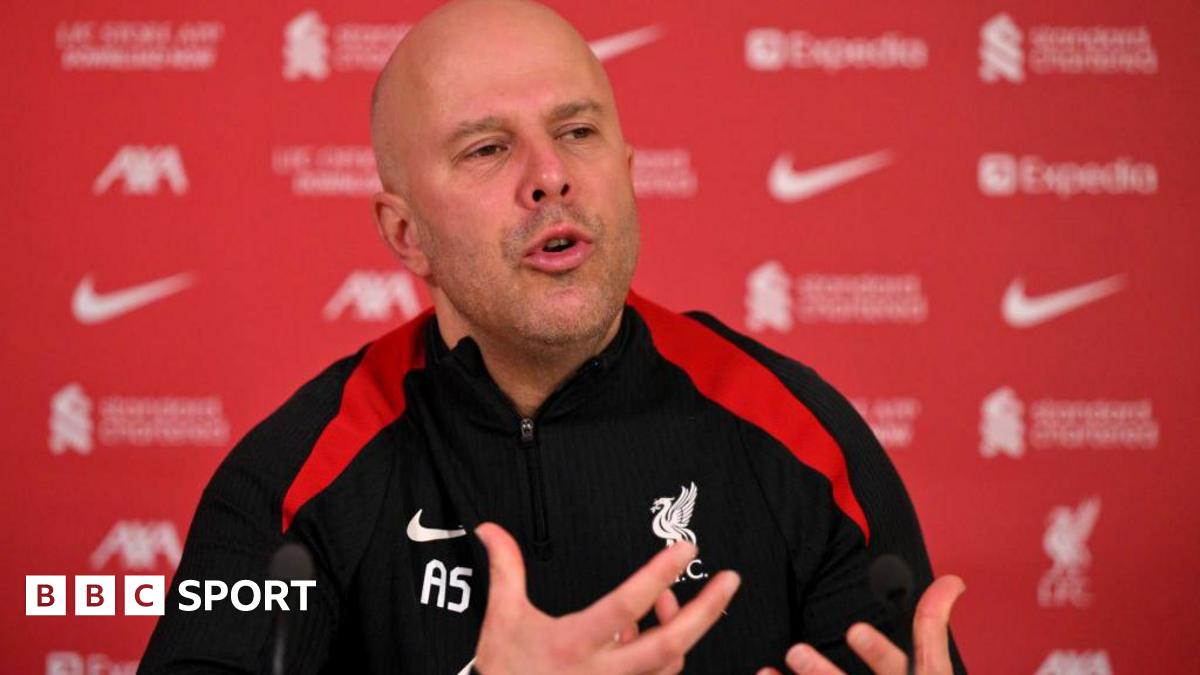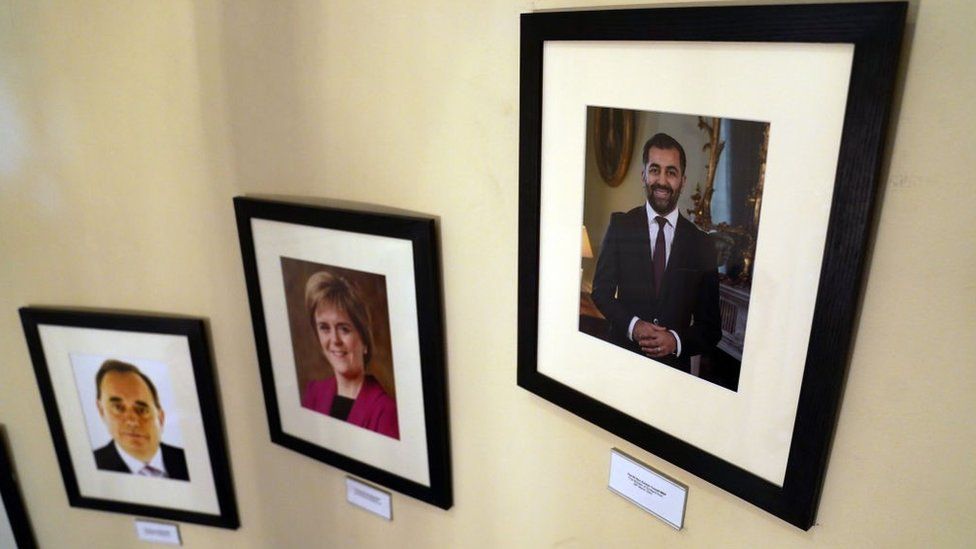 Image source, Getty Images
Image source, Getty Images
Photos of the last three first ministers of Scotland - Humza Yousaf, Nicola Sturgeon and Alex Salmond - on a wall at Bute House in Edinburgh
By James Cook, Scotland Editor & Natalie Higgins
BBC News
A minority government scrambling for support might look chaotic but the Scottish Parliament was designed to encourage rival parties to do deals.
The vision for devolution was to get away from the adversarial atmosphere of Westminster, using a different electoral system to allow smaller parties a bigger voice and to encourage consensus.
There was no sign of that on Monday when Humza Yousaf announced his resignation after clumsily ending a power-sharing arrangement with the Scottish Greens, ejecting them from his government.
With 63 MSPs to the opposition's 65, that left him trying to secure support to carry on in office, a task made more urgent by the tabling of motions of no confidence in his leadership and his government.
The Glasgow Pollok MSP tried to persuade the scorned Greens to back him, to no avail; rejected a deal with the sole MSP from Alex Salmond's Alba party; and, facing a humiliating parliamentary defeat, promptly announced his resignation.
It has not always been so difficult. Handled well, minority government has worked at Holyrood before. Both Alex Salmond and Nicola Sturgeon presided over Scottish National Party (SNP) administrations which relied on opposition support.
Now though, the acrimonious collapse of the pact with the Greens has exposed divisions not just within the parliament in Edinburgh but within the SNP itself over independence strategy, economic policy and social issues such as gender healthcare.
On top of those troubles the party is under the shadow of a police investigation into its finances which has seen former chief executive Peter Murrell, the husband of Ms Sturgeon, charged by police.
Who will inherit these challenges?
Perhaps John Swinney, who led the SNP two decades ago?
He has packed a lot of politics into his 60 years, joining the SNP at the age of 15.
Image source, PA Media
Image caption,John Swinney has been a member of the Scottish Parliament for a quarter of a century
Mr Swinney has been a member of the Scottish Parliament since Tony Blair's Labour Party devolved power to Edinburgh a quarter of a century ago.
Among the potential contenders for the SNP leadership, Mr Swinney's experience is unrivalled.
He has a decade as finance secretary, six years running the education department and a nine-year stint as Nicola Sturgeon's deputy first minister under his belt.
If it is experience you want, Mr Swinney is hard to beat, although there are arguably two John Swinneys.
In public he has been a doughty defender of independence, a parliamentary performer not averse to barracking and heckling his political opponents.
In short, tribal. And yet, behind the scenes, he is that rare figure in politics, a man widely regarded by friend and foe alike as decent, kind and honest.
Many senior colleagues in the SNP are urging him to run, hopeful that he can provide both stability and wisdom after 39-year-old Humza Yousaf's brief, and often troubled, tenure.
They include Westminster leader Stephen Flynn, Energy Secretary Màiri McAllan and Education Secretary Jenny Gilruth.
"These are serious times and serious times demand serious politics and serious people," said Mr Flynn.
"I think the public would be reassured by his presence. I think the party would be united by his presence, and I think that can only be a good thing for Scotland as a whole," he added.
Liz Lloyd, Ms Sturgeon's former chief of staff, suggested that a coronation rather than a leadership contest might be desirable.
"If they can get that sorted quickly and get back to the bread-and-butter basics that people care about, then I think there's potential for the SNP to stop the decline in the polls," she told BBC News.
Could that be Mr Swinney, MSP for North Perthshire?
He is a member of the Church of Scotland and describes himself as a man of deep faith while his most likely rival appears to be Kate Forbes, the former finance secretary who ran Mr Yousaf close in a leadership contest a little over a year ago, also a devout Christian.
During that contest Mr Swinney criticised her for saying she would have voted against gay marriage had she been an MSP in 2014.
"I'm a man of deep Christian faith," he said, "but I do not hold the same views as Kate has set out in the course of the last couple of days."
Hamza Yousaf quits
As a member of the Presbyterian Free Church of Scotland, she saw her campaign against Mr Yousaf blown off course by her socially conservative views on marriage, abortion and gender.
Nonetheless, the Skye, Lochaber and Badenoch MSP secured 48%of the vote with a message that the SNP had drifted under Nicola Sturgeon and needed to sharpen up its act.
"Continuity won't cut it," was her mantra as she attacked Mr Yousaf in sometimes brutal terms.
"You were transport minister and the trains were never on time, when you were justice secretary the police were stretched to breaking point and now as health minister we've got record high waiting times," she told him in a televised debate on STV.
Her assessment of his political skills may have been prescient but it was not well received by some of her parliamentary colleagues who regarded it as disloyal and discourteous.
Now the 34-year-old Ms Forbes is said to be considering running again.
An SNP source said that, if she did, she would need to find a way to frame her social values that did not alienate younger and more liberal voters.
The question for her, said the source, was: "Can Kate find a way to convince others that her views are not going to get in the way?"
So far she has few declared backers. Sibling MSPs Annabelle and Fergus Ewing, whose late mother Winnie Ewing won a fabled by-election victory for the party in 1967, are among them.
"It has to be the new generation & Kate Forbes," Ms Ewing wrote on social media.
"Kate Forbes, without a shadow of doubt, is head and shoulders above all the other candidates," Mr Ewing told the World at One on BBC Radio 4, arguing that she was respected by Conservatives, Labour and the Liberal Democrats and could govern by securing backing from them on an issue-by-issue basis.
"They will trust her," he said, adding: "Alex Salmond ran a minority government with 47 MSPs. We've got 63 so you only really need to win a budget debate and a motion of no confidence. The other debates, frankly, don't matter so much."
Image source, PA Media
Image caption,Kate Forbes ran Yousaf close in a leadership contest a little over a year ago
However, the Greens, who have seven MSPs at Holyrood, do not like the economic or social agenda of Kate Forbes.
Co-leader Lorna Slater said she would not intervene in another party's leadership race but she has been clear that the policies of Ms Forbes would not be acceptable to her party.
The question for the SNP, she said, was whether they wanted to "continue to be a progressive party", committed to "make income tax fairer" and tackle climate change, or to "take a different direction."
Whoever wins the leadership, says James Mitchell, professor of public policy at Edinburgh University, they must refocus on competence.
"There's too much high level visionary stuff, spin and all the rest of it," he said, adding: "very little thought goes beyond that.
"There's very little thought going into delivery."
Or, as deputy first minister Shona Robison put it, bluntly, on Monday night's Reporting Scotland: "We need to get our act together, clearly, and as quickly as possible."
As Humza Yousaf has discovered, governing is hard but governing without a majority is much harder, whether by accident or design.
WATCH: The tumultuous 12 days that ended Humza Yousaf’s time in power

 10 months ago
59
10 months ago
59
